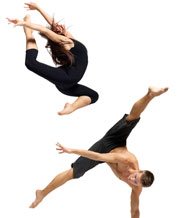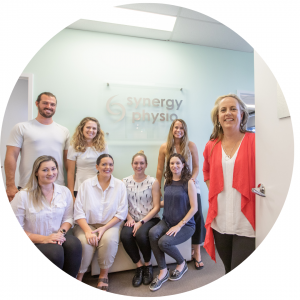
Common dance injuries and how to avoid them.
Are you or your children involved in dance? Did you know that there are several common dance injuries that we see as physiotherapists and there can be simple ways to avoid these injuries?
As a physiotherapist with a background of working with the Australian Ballet Dr at North Sydney I have seen a wide variety of dance injuries in dances of all abilities. Here is a list of the common injuries we see here at Synergy Physio as well as some tips to avoid them.
Number one: heel pain.
It is very common to develop pain at the back of the ankle for a number of reasons. One of the reasons is Achilles tendinopathy, which is essentially a weakness of the Achilles tendon where it inserts onto the heel bone. Achilles tendinopathy often feels worse first thing in the morning creating a few moments of hobbling before the tendon warms up, can be sore at the beginning of dance class and sometimes afterward. If you are a dancer spending time in demi-pointe or pointe you need very strong achilles tendons and calf muscles! If you have increased your classes and hours of dance without building on your calf strength the Achilles tendon can start to complain and create pain.
There is also another common reason for heel pain and that is posterior ankle impingement. This is simply a boney pinching of the back ankle as you rise up into demi. There can be many reasons for this, the most common reason being poor technique, which is sometimes also caused by weakness.
Ways of preventing heel and ankle injuries include:
- Ensure your calf muscle is strong! You should be able to do 25 single leg calf rises (without gripping your toes or overbalancing) with ease. Watch this short video here for achilles tendon tips or read more about achilles pain here
- Ensure you have good demi pointe and pointe technique. This requires the assessment with a physiotherapist but also can be assessed with your dance teacher. Good pointe technique means that the ankle tracks centrally over the forefoot and that you can rise symmetrically without clenching the toes.
Number Two: Another common injury for dances are hip problems.
Due to the high range of movement that’s required and dance is common for dances to develop a variety of hip related injuries. The most common being anterior groin pain as a result of hip imbalance and overload on the front of the hip joint. This can often feel like a sharp pinch in the groin area with certain hip movements, sometimes with clicking and catching.
To prevent this.
- Ensure you have an adequate assessment with the physiotherapist who can assess what is causing your hip pain and also assess your dance technique.
- Ensure you have adequate turn out mobility. This can require further stretching and often needs specific hip strengthening exercises. However sometimes hip turn out is limited by the shape of our bones! A physiotherapist will be able to tell you if it is your bone structure or your muscles that are limiting your hip range of movement.
- Like to learn more about hip labral tears and hip impingement? Find out more here
Number Three- Muscle strains.
The most common reason we see for muscle strains is not being warmed up before class, or dancing through fatigue. Spend time doing a dynamic warmup to ensure your muscles are warm and flexible prior to your dance class!
There are certain times of use are also more common for dance injuries.
- We often see dancers coming with injury in the early phases of school term one and that they have had time off over Christmas and expect to be able to resume their normal activities without any hiccups. However sometimes coming back after a period of rest means that you need to spend some time building on your strength again.
- The other times we see injuries are just prior to performances when dances tend to increase their hours that they spend in dance which leads to fatigue and overload.
- Growth spurts are another common injury risk time.

Like to know more about dance injuries?
Here at Synergy Physio our team are dedicated to helping yuou with pain and injury prevention! If you have more problems and would like to contact us about a dance or pointe assessment please feel free to Contact us for more information on 07 544483369 and we look forward to helping you! Or you can simply book online!
Follow us on facebook instagram for regular health tips!

Leave A Comment